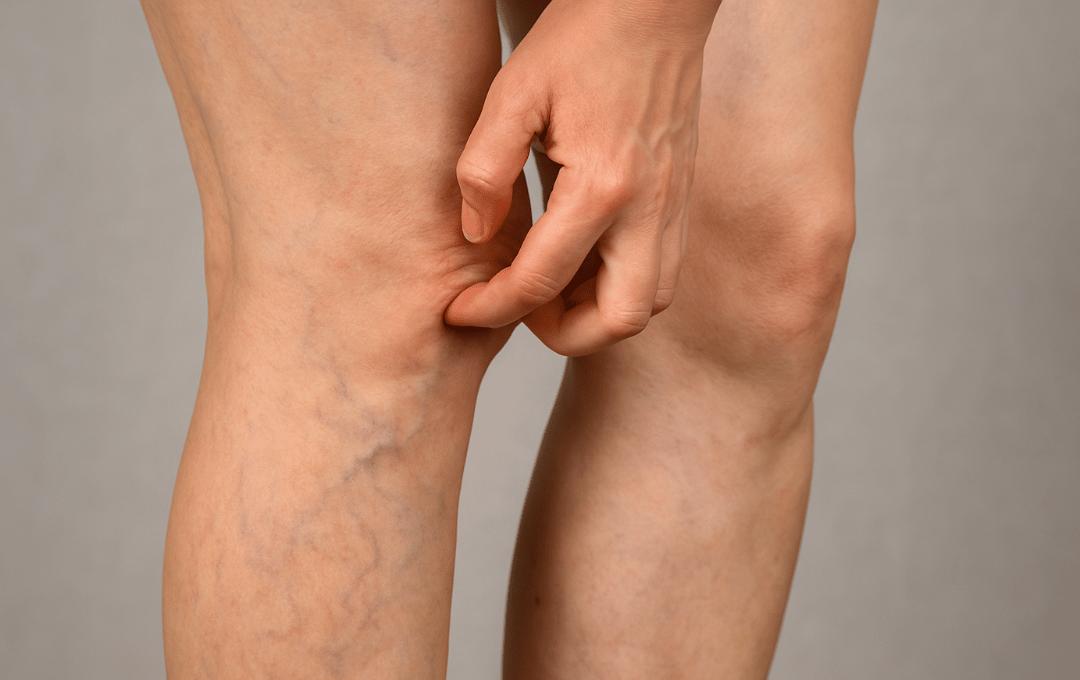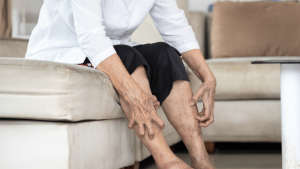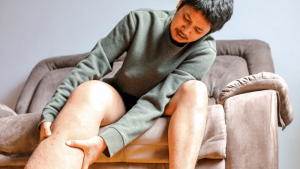
After walking or running, you may notice your legs feel itchy, especially around your veins. Having it happen only once may not seem concerning, but when it appears to occur consistently, it’s natural to begin worrying about what might be causing these itchy veins.
One potential reason is varicose veins. These enlarged and twisted veins develop when faulty valves inside the veins disrupt normal blood flow, most often in the legs. While aching, heaviness, and swelling are widely recognized symptoms, many are surprised to learn that itchy skin is also a common sign of varicose veins.
Learn what causes varicose veins to itch, ways to ease itchy veins, and how to recognize if your itching veins are a sign of an underlying condition, such as .
What Do Itchy Veins Feel Like?
Itchy varicose veins often create sensations beyond ordinary dry skin. This feeling is more like a persistent itch that doesn’t entirely go away, even after scratching. It is also common to experience a burning or tingling sensation, or even a “crawling” feeling just beneath the skin.
Unlike simple dryness, this discomfort is often felt around the varicose vein itself, which may have visible swelling or look bluish and twisted. Recognizing these signs can help you distinguish itchy veins from common skin irritation.
Why Do My Varicose Veins Itch?
Veins that itch are a sign of what’s happening inside the vein. When the valves in the vein stop working correctly, blood can pool and create pressure. This pressure leads to inflammation, which irritates the surrounding skin and nerves. Over time, the skin over the affected veins may become dry, discolored, or develop a rash-like condition known as venous or varicose eczema. Itchy veins often worsen when standing for long periods, during hot weather, or after a day of activity.
Are Itchy Varicose Veins Dangerous?
While varicose vein itching may seem like a minor inconvenience, it can signal a more serious vein problem. In many cases, persistent itching is an early warning sign of chronic venous insufficiency (CVI). This condition is where leg vein valves weaken or fail, allowing blood to remain stagnant and causing the veins to dilate.
Over time, this ongoing pressure and inflammation can lead to more serious complications, including:
- Skin thickening
- Painful swelling
- Aching in the legs
- Heaviness in the legs
CVI usually develops gradually, so what may begin as occasional itchy veins or mild swelling can worsen if left untreated. Since itchy varicose veins often indicate underlying vein disease rather than a simple skin issue, visiting a vein specialist for an early diagnosis and treatment can help prevent further damage.
Can Varicose Veins that Itch Go Away On Their Own?
Itchy varicose veins rarely resolve on their own without addressing the underlying cause. If the itch stems from vein disease and is left untreated, scratching can damage the skin, leading to irritation, bleeding, or even open sores, so avoid scratching or further irritating the surrounding area.
Some at-home remedies can temporarily relieve symptoms of varicose veins, such as moisturizing with fragrance-free lotions to reduce dryness or regularly taking breaks from prolonged sitting or standing to improve circulation by elevating the legs.
However, the best treatment for itchy veins is targeting the varicose veins themselves, especially if the itching persists alongside the development of other symptoms of vein disease.
Signs It May Be Time to See a Vein Specialist
Here are some warning signs to look out for that may indicate it’s time to see a specialist about itchy veins:
- New or unexplained discomfort, such as burning or tingling sensations.
- Persistent or worsening itchiness, especially around visible and bulging veins.
- A history of varicose veins with new or unexplained symptoms.
You should also consult a specialist if the itchy varicose veins are accompanied by:
- Swelling
- Leg heaviness
- Throbbing
- Noticeable skin discoloration and thickening
Recognizing these symptoms early prevents progression to chronic venous insufficiency (CVI) or skin ulcers. If you’re unsure whether your symptoms are from vein disease, our symptom quiz can help you see if it’s time to consult a vein specialist.
Treatments for Itchy Varicose Veins
What can be done about itchy varicose veins? The best option is to target the varicose veins themselves through vein treatments.
USA Vein Clinics offers minimally invasive procedures designed to close faulty, itchy veins and reroute blood flow through healthy ones. These outpatient treatments are performed in comfortable clinic settings and require little to no downtime, allowing patients to return to their regular activities quickly. By addressing the source of the issue, these procedures not only relieve itching but also prevent further complications from occurring.
Get Relief from Itchy Varicose Veins
Itchy varicose veins are not only a nuisance but can also be an early sign of vein disease. The best way to find relief from itchy veins is with targeted treatment, which is where USA Vein Clinics can help.
We are accredited by the Intersocietal Accreditation Commission (IAC) for Vascular Testing, demonstrating our commitment to delivering high-quality care. This care includes minimally invasive vein treatments that have fewer side effects and shorter recovery times compared to traditional surgery, allowing you to return to your daily routine quickly.
Don’t let itching progress to more serious issues. Schedule a consultation today to get an effective treatment for itchy varicose veins.
FAQs About Itchy Varicose Veins
Does Scratching Varicose Veins Make Them Worse?
Scratching itchy varicose veins can make them worse, as it breaks the skin, increasing the risk of bleeding or infection and worsening dryness or venous eczema. In severe cases, scratching can lead to the development of ulcers, particularly in individuals with chronic venous insufficiency (CVI).
What’s the difference between dry skin and vein-related itching?
Dry skin itching usually affects the entire body and improves with moisturizer, while itchy veins are localized over bulging or twisted veins and may include swelling, heaviness, or skin discoloration. Persistent itching focused around varicose veins is more likely vein-related than simple dryness.
Are itchy veins always a sign of vein disease?
Itchy veins are not always a sign of vein disease, as temporary irritation, allergies, or dry skin can cause itching. However, persistent itching around visible veins accompanied by other symptoms may be a sign of underlying vein disease.


